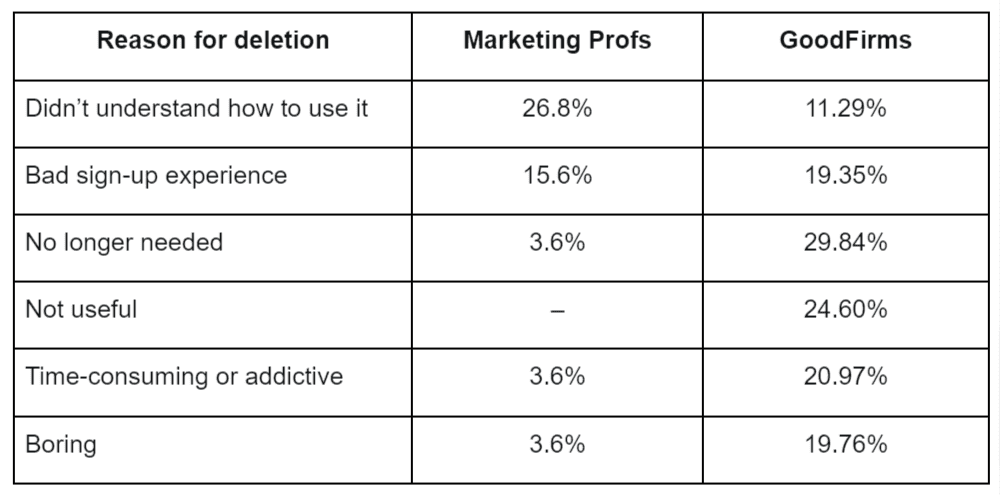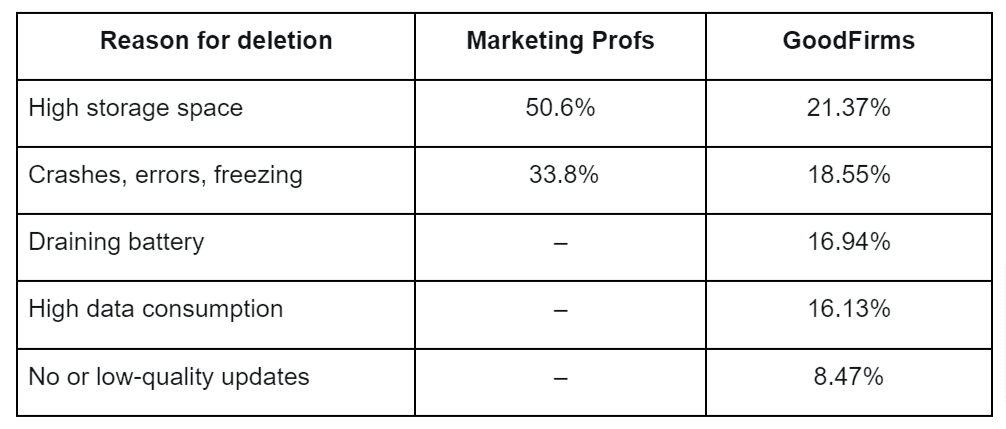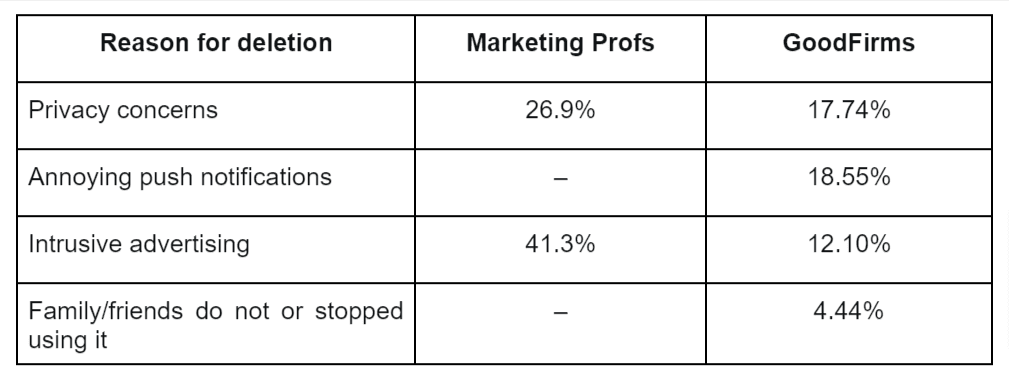Did you know that the Apple Store and Google Play Store have 1.96 million and 2.87 million apps available for download, respectively? Such a competitive digital market makes it really difficult to keep up with the ever-increasing customer demands. Nowadays, end-users have zero tolerance for bugs or performance issues – if an app does not satisfy their needs, they will not hesitate to uninstall it and move on to try something else. According to AppsFlyer, almost 1 in every 2 apps installed are uninstalled within 30 days.
Why do users uninstall apps?
The reasons why users uninstall apps can be grouped into three generic categories:
Utility
Performance
Other.
Utility

Fundamental aspects that impact users’ decision to uninstall an app are poor design and inferior overall user experience. An infographic by Marketing Profs shows that:
26.8% of users uninstalled an app because they didn’t understand how to use it
15.6% cited overly-complex registration as the reason for deletion.
A study by GoodFirms showed similar results, i.e., 19.35% of users cited bad sign-up experiences and 11.29% lack of understanding of how to use the app as the reason for uninstallation.
Other frequently mentioned grounds for app uninstallation were that the app was no longer needed (29.84%), not useful (24.60%), too time-consuming or addictive (20.97%), or simply boring (19.76%).
Performance

A key factor that impacts users’ decision to uninstall an app is the overall app performance. Both Marketing Profs and GoodFirms surveys show that:
Users will not hesitate to delete an app when it takes up too much storage space. Numbers wary from 21.37% to an astonishing 50.6% of users, depending on the study.
Poor app quality will push from 18.55% to 33.8% of users to get rid of it (this includes app crashes, errors and freezing).
Other performance-related issues cited in the studies include battery draining (16.94%), high data consumption (16.13%), and no or low-quality updates (8.47%).
Other

Another major reason for app deletion is users' trust. Statistics show that up to 26.9% of users name privacy concerns, such as asking for too much personal information, forced opt-ins and social logins, or objectionable permissions. Apart from that, users mentioned such reasons as excessive push notifications and in-app messages (18.55%), intrusive advertising (from 12.10% to 41.3%depending on the study), and the fact that their friends/family stopped using the application (4.44%).
Conclusion
These statistics show that users will not put up with a mediocre app quality. With the multitude of applications to choose from, users get to be picky and expect a powerful experience. Hence, if you want your app to succeed, high quality is one of the key factors you need to keep in mind.
How to achieve high quality?
Human errors can cause a defect or system failure at any stage of the software development life cycle. Results can be trivial, but they can also be catastrophic. It goes without saying that every team member is responsible for the quality of their work, but is this collective ownership enough to deliver a unique product of exceptional quality? Shouldn’t all software components be evaluated under various expected and unexpected conditions to identify defects or reduce flaws? Who looks at the app as an end-user when the developers work on the product from the code perspective?
Who is a QA Engineer?
Drawing from Dan Ashby’s spot-on article, a QA Engineer is a person who, once asked to write test cases for a blank sheet of paper, will not reply by listing test cases right away, e.g.,:
Verify whether it’s blank
Verify whether it’s paper, etc.
but will rather start asking questions.
The only way to write accurate test cases is by learning more about the product and its purpose. You need to know what this paper will be used for (In a printer to print on? As a door stopper? As toilet paper?) and understand what the product will do to write valid test cases and, later on, test the product.
Understanding Quality management
SOURCE: The Difference Between Quality Assurance, Quality Control, and Testing
Quality Assurance
It is an essential process-oriented activity in quality management that focuses on the integrity of the product. It determines whether a product or service meets its set of requirements before it’s released to the public. It centres around implementing and improving processes, procedures and standards in the context of verification of developed software and its requirements. It provides confidence for stakeholders and ensures the delivery of the best product possible.
Quality Control
It is a software engineering process that is reactive and product-oriented. Its objective is to determine that the end result meets the client’s expectations and to produce defect-free software that will satisfy users' needs. Quality Control examines the quality by detecting defects in the product, its source code and all of its components.
Testing
It is a process that determines how well a program or application performs from the end-user perspective. It utilises various testing techniques and methods with the aim of verifying whether the designed product performs as required when subjected to various expected and unexpected conditions. It ensures that the intended purpose of the product is followed. In short, it’s about finding and promptly eliminating bugs before the product is in customers’ hands.
To make a long story short
Quality assurance, Quality control and Testing are all required to deliver an enhanced quality product. By using these three processes jointly, it becomes easier to identify the defects and flaws, and therefore ensure that the product complies with the requirements and works as expected.
Bottom line
With such a great number of applications to choose from, only an excellent-quality product will satisfy the end-user. Anything lower than that and you may see your customers walking away. Few other stand-alone elements of a successful application have as prime an impact as quality. Quality management is an imperative component of software development as it focuses on improving consistency and performance. QA Engineers will push a system in unobvious directions and check it under various expected and unexpected conditions. QAs provide a creative human element that cannot be achieved by only testing the code itself. Finally, QAs make it possible for people to enjoy good software and therefore enhance your success by helping you create a competitive and successful product.

Kasia Gorochowik
Senior QA

